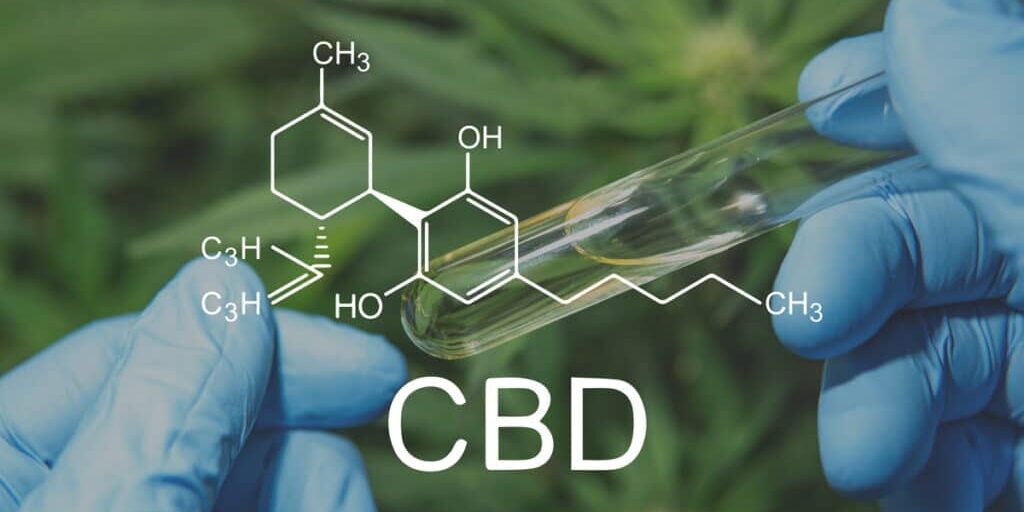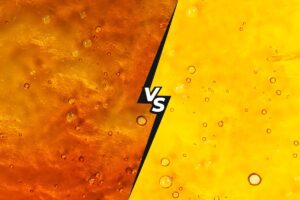First things first, we must distinguish between the two major players in the cannabis field — Δ9-tetrahydrocannabinol, a.k.a. the “Wild Child” THC, and its much mellower chemical cousin CBD. THC and CBD are natural medicines called cannabinoids, and the cannabis sativa plant exclusively produces them.
Let’s break down the ways THC vs CBD hunger effects differ.
THC vs CBD appetite effects
THC and CBD cannabinoids come from the same plant species. They even have the same chemical formula (C21H30O2)! But a slight difference in their molecular shape causes them to produce night-and-day opposite effects when you take them.
Research shows the main difference between THC vs CBD is how they work in the body to promote health effects.

Effect of THC on appetite
THC molecules have a unique shape that allows them to bind with cannabinoid receptors CB1 and CB2 in your endocannabinoid system (ECS). The ECS controls functions like hunger, appetite, energy metabolism, mood balance, and stress response.
Scientists think THC interacts with the complex hormonal network that regulates hunger and appetite via the ECS. For example, one study shows THC use is associated with a spike in ghrelin levels, a powerful hunger hormone that creates a physical need to eat. An increase in ghrelin feels like an “empty” or “rumbling” stomach, and it’s why everything sounds delicious after marijuana use.
Consider taking THC:CBD ratio products if you want to increase appetite and weight gain.
Does CBD make you hungry like THC?
It’s time we blow the lid off the social stigma and correct the record about CBD’s effect on appetite.
So, does CBD make you hungry, or has the culprit behind this common misconception been THC all along?
Decades of cannabis research tell us that CBD does not increase appetite or make you hungry. Studies show Cannabidiol (CBD) has a very low “affinity” and cannot bind to the same CB1 and CB2 receptors in the endocannabinoid system (ECS). This means THC vs CBD have different mechanisms of action that produce different effects.
Instead, CBD works through another signaling pathway called TRPV-1. Here’s an interesting factoid about TRPV-1 receptors: You can feel them when activated! TRPV-1 is known as the “hot pepper” receptor and causes the burning sensation you feel when you eat spicy food. You can also feel these receptors when you sip hot coffee or tea.

Researchers have found that stimulating TRPV-1 receptor sites may be a mild appetite suppressant. TRPV-1 stimulation also supports other CBD health benefits like improved mood, pain and inflammation relief, and better sleep.
Can CBD Assist in Weight Loss?
CBD oils may help you lose weight when used as part of a balanced diet and healthy lifestyle changes.
According to a systematic review of 11 clinical trials, CBD use was correlated with a decrease in appetite and body weight in every CBD group using high-dose CBD products compared to the placebo group.
Weight loss results from oral CBD use are dose-dependent, according to research. Low CBD doses (e.g., 25 to 50 mg) were not associated with weight loss or a decrease in BMI in clinical trial participants.
The endocannabinoid system and appetite
The endocannabinoid system (ECS) plays a role in some of the most essential functions in the human body, including hunger, food intake, and weight changes. But CBD interacts with this system in a different way than THC.
THC binds to CB1 and CB2 endocannabinoid receptors in the brain, which can spike hunger hormone levels in your body that encourage you to reach for another slice of pizza. CBD does not bind with these receptors in the same way, negating the appetite stimulation effect that THC is famous for.
So, does CBD increase appetite?
The straightforward answer to does CBD increase appetite is a resounding no. Interestingly, CBD may serve to decrease your appetite. One key reason lies in its effects on emotional well-being, particularly its ability to alleviate stress, anxiety, and depressed mood.
For instance, many of us are familiar with emotional eating habits — like demolishing an entire block of chocolate after enduring a stressful day at work. CBD may reduce the likelihood of such emotional eating episodes by providing relief from the effects of everyday stress.
The full spectrum dilemma
Before you go gulping down full spectrum CBD oil or some free CBD samples, thinking you’ll be immune to the allure of all that tasty food in your kitchen pantry, hear us out for a moment. Full spectrum CBD oils contain THC, albeit in tiny trace amounts. So, if you’re particularly sensitive to it, you might find your pantry a little emptier than usual, as THC is an appetite stimulant.
Choose broad spectrum CBD or isolate CBD products with no THC if you think you have a sensitivity to the psychoactive cannabinoid.

RELATED: How much CBD should I take?
CBD and weight changes
Everyday stress, occasional anxiety, and mild depression are well-known triggers for weight loss or weight gain.
Emotional eating habits take many forms, from losing one’s appetite entirely to using food as a coping mechanism, resulting in unpredictable meal choices and body weight changes.
Taking CBD daily may help to fortify your body’s natural stress defenses, reduce nervousness and nervous tension, and promote a positive mood balance. These health effects may play a potentially significant role in stabilizing body weight and supporting overall health.
Achieving Fitness Goals with the Help of CBD Oil
Sports research shows CBD products can help improve your strength and performance through better recovery, regeneration, and relaxation. Taking full spectrum or broad spectrum CBD oil once or more times daily soothes sore muscles and achy joints, reduces inflammation, helps you sleep better at night, and promotes weight loss when combined with healthy lifestyle changes like a balanced diet and regular exercise.
Final thoughts about CBD appetite effects
When it all comes down to it, does CBD increase appetite?
Nope! The evidence shows you never need to worry about getting a case of the midnight munchies from CBD, no matter how much you take, according to all existing evidence.
But hey, if you are hankering for a midnight snack, we don’t judge. Go wild — just don’t blame it on the CBD oil! CBD may help you manage these sneaky snacky impulses you are prone to having. However, studies are still in progress, and over time, we can expect more definitive results on the effects of CBD, appetite suppression, and weight changes.
Does CBD make you hungry FAQ
Get answers to the most frequently asked CBD appetite questions below. Visit the Cannabiva CBD and Hemp Learning Center if you’re new to CBD. We’ll show you everything you need to know!














